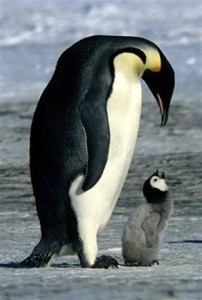The March Of The Penguins – delightful, extraordinary, respect

the good news is - the film crews have gone
![]()
March of The Penguins – Luc Jacquet
Peerless cinematography (Laurent Chalet, Jerome Maison) and impeccable, sensitive editing (Sabine Emiliani) make this a shoe-in for a documentary Oscar. Every camera shot, every note of Alex Wurman’s lyrical score, breathes a sense of respect for these extraordinary, impossibly endearing creatures. So it is disturbing to read that in the French version Jacquet has actors voicing-over two of the penguins to express shamelessly anthropomorphised, totally unnecccesary, human endearments to one another.
Thankfully we are spared that crass excess in the US version. Here only Morgan Freeman’s narration is heard. Many critics have considered even this overly sentimental. In truth, one cannot watch the extraordinary story of the Emperor penguins’ annual walk 70 miles over the Antarctic ice, not once but six times, to and from their breeding grounds, without using words which parallel their behaviour to many of the best qualities in human beings. Without the stupid misjudgement of actor voice-overs, I defy anyone watching the mating and parenting rituals of these comic yet irreducibly dignified creatures, not to be driven to use words like tenderness, fortitude, determination, care, even grief. And they are rightly used. Freeman’s words, not tone, do occasionally err towards the sentimental but nothing can diminish the stark, hardly credible story of the penguins’ against-all-odds survival in the coldest place on earth.
There is a serious philosophical issue here. It is not that when we see other creatures displaying behaviour like stroking, holding, caressing, gentleness etc we falsely anthropomorphise our description. Rather, if we accept our own evolutionary roots as mammals, and reject certain philosophical misconceptions about language, we should say our language of love and affection also has its roots in strikingly similar ‘given’ forms of behavioural response to each other and the world around us. Especially say the naked vulnerability of the newborn. The test of anthropomorphism not always easy to apply, is whether animals are attributed with behaviour that only makes sense for self-conscious, language-users. But many of our deepest human emotions such as grief have primitive roots. To describe the female penguin in the film whose chick has died from cold and who tries to steal another penguin’s chick, as a form of grief is not a misuse of language. You must simply maintain a sense of penguin grief as having many important differences from human grief, despite some very real basic behavioural forms of expression in common. We recognise it because we share it.
This point of view will hardly endear itself to the large Christian Fundamentalist and Creationist market the film has attracted in the US. It is hard to imagine a less convincing creature than the penguin to support the Creationist prejudice. They look like birds designed by a committee. Literally neither fish nor fowl. Or creatures who only ever made it halfway out of the evolutionary swamp. Superbly adapted for the water, their long trek across the ice plodding upright or sliding ignominiously on their stomachs seems like an almost human perversity. Out of water their flightless wings become merely charming absurdities. And their painstaking, frustrating efforts to protect first their eggs and then chicks from the lethal cold, is a triumph of determination over genuinely effective evolutionary adaption. And if God intentionally made creatures in this form then the penguin is long overdue for product recall and re-design.
Much is in the eye of the beholder here. The discreetly shot pictures of the penguins mating are either sensitive or coy depending on your starting point. Also I expect it is true that the more brutal realities of penguin life are not dwelt upon at length. The only other issue I suppose is whether Jacqet has imposed a false ‘narrative’ on the instinct-driven struggle for survival of these beautiful creatures. Here for me a similar philosophical point to that above applies. In the seasonal, cyclical continuity and ‘connectedness’ of the penguin group behaviour we are perhaps witnessing the natural history basis of the apparently universal human tendency to see our lives as a story: a narrative of connected, purposeful behaviour directed to a planned and hoped for outcome with a deeper meaning.
All this intellectualising apart. MOTP is a delight. OK the oooh and aagh count is high. But nothing but nothing can still the sense of extraordinary triumph over implacable necessity of these caneless Chaplinesque waddlers who seem to be locked in a perpetual battle on land at least, with the perversity of their own bodily deficiencies. The pictures are simply mesmerising; from the long strung out single file columns stretching into the distance like refugees from Dr Zhivago to the socially organic earth-bound flock of hundreds of creatures huddling for survival warmth in mutual dependence against the worst weather on the planet. You don’t have to attribute human qualities to them to regard them with the utmost respect and admiration.
(March 2006)
Filed under: 3 star, Documentary, General, Hollywood, Luc Jacquet, Oscar Winner, Philosophical

